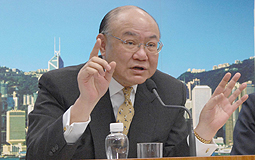 |
| Options mooted: Justice Woo Kwok-hing unveils the Law Reform Commission's consultation document on jury service criteria. |



|
The Law Reform Commission has proposed extending the upper age limit for jury service and reducing the categories of people automatically exempt from jury service.
Releasing a consultation paper on jury service criteria today, the commission's Juries sub-committee chairman Justice Woo Kwok-hing said the jury plays a key role in the city's criminal justice system, and there is a need to make more people eligible for jury service.
The jury system should remain comprehensible and accountable to the community it exists to serve, he added.
Recommendation details
The consultation paper recommends the minimum age for jury service be maintained at 21, but the upper age limit should be raised from 65 to 70. An individual who has attained 65 years of age should, however, be entitled to exemption from jury service if he makes such an application.
To ensure jurors have a reasonable connection with Hong Kong and some understanding of local norms, values and culture, the document proposes that potential jurors must have been resident in Hong Kong for three years or more immediately before they are issued with a Notice of Jury Service.
If a juror has been issued with a Hong Kong identity card three years or more prior to his being issued with the notice, he should be presumed to be a Hong Kong resident.
The paper recommends that no one be eligible for jury service if he has a previous criminal conviction other than a spent conviction, or if he is charged with an indictable offence and has not yet been tried, or if he is charged with any offence and remanded in custody pending trial.
The idea of excluding undischarged bankrupts from jury service was rejected because it would be wrong to automatically characterise undischarged bankrupts as not of "good character."
Education requirement
The sub-committee considered the existing administrative practice of requiring jurors to have attained an education standard of at least Form 7 or its equivalent should be maintained, but this should be stipulated in legislation.
However, as a new curriculum for secondary education will be implemented in 2012, it proposes that the education standard required should be amended in 2012 to require a juror to have completed Secondary Six and achieved Level 3 in both English and Chinese in the Hong Kong Diploma of Secondary Education or its equivalent.
The paper does not propose any changes to the existing provisions relating to jury service and the disabled.
The sub-committee said the Jury Ordinance uses the term "exemption", without differentiating between different types of exemption. It therefore suggests that different terms should be adopted in different situations so that the reasons for the individual's exemption or exclusion from jury service may be more readily understood.
Clearer definitions
The proposed terms are:
* "ineligible for jury service" when a person is not qualified to be a juror because of age, unsoundness of mind, or illiteracy;
* "excluded from jury service" when a person is excluded on a point of principle;
* "exempt" for those categories of people whose services are much needed and in respect of whom there would be substantial inconvenience to the public if they were required to serve on a jury;
* "excused" when an eligible juror is excused from serving on a particular occasion upon application being made to the Registrar or the trial judge, but his service would be required for future cases.
The consultation paper suggests the guiding principles for granting exemptions, exclusions or deferrals be set out in the Jury Ordinance and the justifications should include the fact that:
* substantial inconvenience to the public may result;
* undue hardship or extreme inconvenience may be caused to the individual concerned;
* the person is involved in the administration of justice so that bias may result or may be perceived to result; and
* jury service is incompatible with the person's tenets or beliefs.
Fewer exemptions
On the basis of these principles, certain categories of people who are currently exempt from jury service should no longer be exempt, but they should instead be able to apply to be excused from jury service in a particular case.
Those who should no longer be exempt from jury service include: justices of the peace; apprentices or trainees; doctors, dentists and veterinary surgeons; newspaper editors; chemists and druggists; clergymen and those holding similar positions in any congregation or those who are full-time members of any monastery; pilots, navigators and wireless operators and other aircraft crew-members; and the spouses of certain members of the Judiciary.
The sub-committee also proposes that the Registrar or trial judge may defer jury service by anyone in these categories, or exclude or excuse them from jury service, if satisfied with the merits of their application.
The consultation will last until April 30. The consultation paper can be downloaded here.
Go To Top
|



